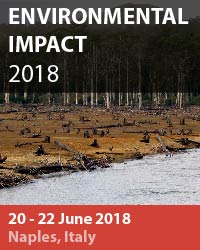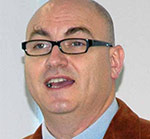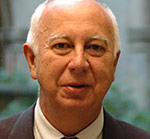Environmental Impact 2018
4th International Conference on Environmental and Economic Impact on Sustainable Development
![]()
20 - 22 June 2018
Naples, Italy
Overview

The fourth International Conference on Environmental and Economic Impact on Sustainable Development took place in Naples, Italy, organised by Wessex Institute, represented by Professors Giorgio Passerini, Juan Casares Long and Giovanni Perillo.
The conference was sponsored by WIT Transactions on Ecology and the Environment and the International Journal of Environmental Impacts.
Situated in the southern Italian region of Campania, Naples is one of Italy’s oldest and most important cities. The birthplace of some of Italy’s most iconic food and drink, good restaurants and cafés are plentiful in Naples, serving fresh local seafood and regional specialities. The historic centre is recognised as a UNESCO World Heritage site and offers a wealth of interesting architecture, monumental castles and museums, as well as galleries exhibiting works by some of Italy’s most distinguished artists. The surrounding area and coastline provide picturesque views of Capri and numerous small islands, while nearby Mount Vesuvius and the Roman remains of Pompeii and Herculaneum remain some of the most notable sites in southern Italy.
The conference took place in Villa Doria D’Angri, the most important neoclassical villa in the famous district of Posillipo. It was commissioned by Prince Marcantonio Doria d'Angri (1809-1837), a leading exponent of the family of Genoese origins. The work, through the design and supervision of the architect Bartolomeo Grasso, was completed in 1833. The view of the Gulf from the windows of Villa Doria d'Angri is so beautiful that Wagner, admiring it as a guest in 1880, eventually was inspired to compose the Parsifal, one of the most important musical masterpieces of all time. Wagner came to Naples with the royal train of Ludwig of Bavaria, was a guest at the villa for eight months, completed the Parsifal, and wrote the autobiographical book "My life". On the patio facing the “Salone” of the Villa, on 22 May 1880, the great Joseph Rubinstein premiered at the piano the music that accompanies the stage metamorphosis of the 1st act of Parsifal while everyone enjoyed the magnificent panorama at sunset from the Villa. Since then, the room where Wagner stayed has been called the "Wagner Room". It is today one of the buildings of the University “La Parthenope” and hosts a part of the Museum of the old Naval School of Naples.
Opening of the Conference
The Conference was opened by Prof Giorgio Passerini and Prof Juan Casares Long, Directors of WIT who welcomed the delegates in the name of the Wessex Institute and firstly paid tribute to its founder, the late Prof Carlos Brebbia. Carlos was a gifted academic, renowned throughout the world as the originator of the Boundary Element Method, a tool now widely used for practical engineering analysis. Recent developments at the Institute continue to expand its range of applications in a myriad of problems of interest to engineering practitioners. The dissemination of scientific and technical information is one of the primary functions of WIT, together with the continuous research and development of advanced computational tools.
Giorgio explained the function of WIT and that for over a quarter of a century it has organised an International Conference programme on a variety of topics, bringing to the attention of the community the latest developments across interdisciplinary research subjects. This wealth of information is available Open Access in the digital library of the Institute (https://www.witpress.com/elibrary) where all environmental impact papers can be freely downloaded.
Special Session
A special session was organised by Shahla Wunderlich from Montclair State University, USA, on the topic of “Food and Environment”, which included the following papers:
- Food supply chain in the United States: Potential environmental impact.
- Effective utilization of the stockpiled food in the local government storage through food banks in Japan: reduction of food waste.
Invited Speakers
The conference was further enhanced by a number of invited presentations:
- “Landfill mining intervention on MSW sites”, by Giovanni Perillo, Wessex Institute, UK.
- “In situ remediation of hexavalent chromium in groundwater: five case studies”, by Roger Olsen, CDM Smith, USA.
- “Challenges in cumulative impact assessment: case studies from Canterbury, New Zealand”, by Bryan Jenkins, University of Canterbury, New Zealand.
- “Environmental impact assessment using a weighted global index: A methodological proposal”, by Admilson Irio Ribeiro, Sao Paulo State University, Brazil.
- “Environmental sustainability and quality of life: implications for psychological interventions”, by Yuri Pykh, Russian Academy of Sciences, Russia.
- “Temporal change of indoor-VOC composition – consequences for human health risk assessment”, by Olf Herbarth, University of Leipzig, Germany.
- “Environmental indicators in forest fragments from urban watershed”, by Regina Longo, Pontifical Catholic University of Campinas, Brazil.
- “The impact of a CO2 reduction target on the private car fleet in the Netherlands”, by Jaap Vleugel, Delft University of Technology, Netherlands.
Session Topics
Invited papers were classified in a series of sessions under the following headings:
- Environmental Assessments
- Environmental Policies and Planning
- Remediation
- Development Issues
- Health Risk
- Natural Resources Management
- Energy and the Environment
- Monitoring, Modelling and Forecasting
- Water Resources Management
Conference Dinner
The conference offered numerous opportunities for discussions and networking, bringing together people from different countries to exchange experiences. There were a series of extended coffee breaks and lunches. It was incredible that the delegates had coffee breaks and lunches in the same “Salone” and on the same patio where Wagner and Rubinstein shaped the History of Melodrama.
The Conference Banquet took place at “La Scialuppa” (the Jolly-Boat) within the wonderful “Borgo Marinaro”, the oldest maritime village of Naples located near Castel dell’Ovo. The guests enjoyed freshly caught fish, mussels and the famous “Greco di Tufo” white wine while listening to the most beautiful songs of the Naples’ tradition. A special song was dedicated to the Memory of the late Prof Carlos Brebbia.
The International Scientific Committee of the conference met over dinner to discuss the proceedings and find ways to improve the meeting when it is reconvened in 2020. Several nominations for new Committee members were received and possible locations were suggested.
Closing of the Conference
The conference was closed by Giorgio Passerini and Juan Casares Long who thanked the delegates for coming and hoped that they will consider presenting in Environmental Impact 2020.
Related Conferences
Sustainable Development and Planning 2018, 4 - 6 September 2018
Waste Management 2018, 17 - 19 September 2018
Energy and Sustainability 2019, 3 - 5 July 2019
Sustainable City 2019, 1 - 3 October 2019




 Wessex Institute
Wessex Institute